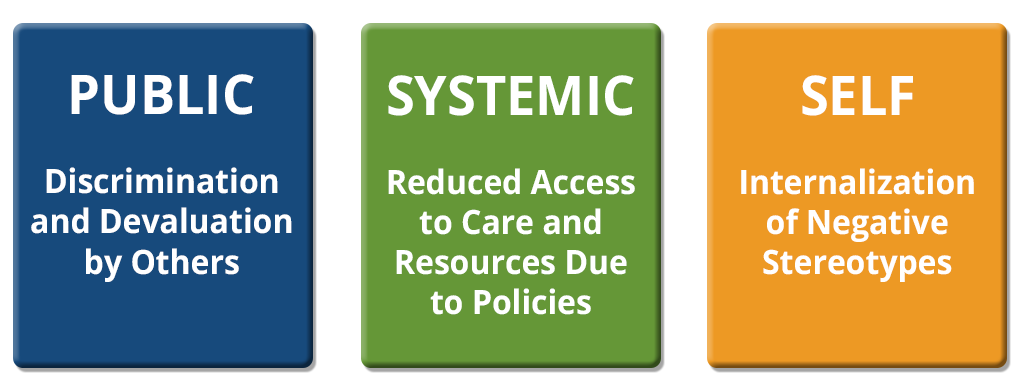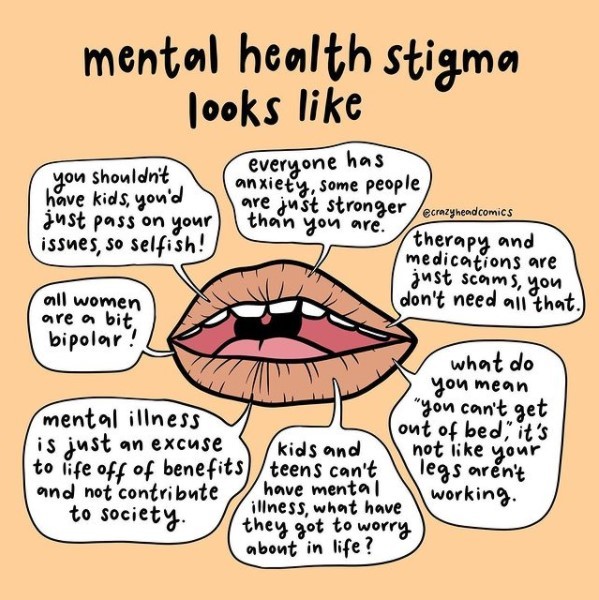Reducing Stigma
What is stigma generally in our society? What is the stigma of mental health conditions and substance use? How does this stigma affect people and keep them from receiving the treatment they need to live full, productive lives? These are just a few of the many questions surrounding stigma. We wanted to publish this page as a resource and a recognition that the ongoing roles we all play in breaking down stigma are important and meaningful.
Taking a dictionary definition approach, stigma is "a mark of disgrace associated with a particular circumstance, quality, or person.” For purposes of behavioral health, people often assign negative qualities to a person based on their circumstances.
3 Types of Stigma

Stigma usually appears in three forms. Here's how it can influence people consciously and unconsciously
- Public - Discrimination and devaluation by others. Stigma in the public sphere can refer to stereotypes of people with behavioral health conditions. Belief in those stereotypes and actions taken in response can affect job prospects, housing decisions, even the quality of healthcare that they receive.
- Systemic - Reduced access to care and resources due to policies. Systemic stigma exists when those public stigma stereotypes are embodied in laws, institutions, and organizations that regulate or influence society. While public stigma affects individuals or smaller groups, systemic stigma affects large groups of people.
- Self - Internalization of negative stereotypes. Internalized stigma affects a person's self-esteem and self-efficacy leading to persistent doubt and hopelessness.
Why Breaking Stigma Matters
Addressing the influence of stigma and working to reduce it is vitally important in addressing the behavioral health needs of our state. Stigma serves as a barrier to treatment keeping a person in a potentially life-threatening situation. Listen to the perspective in this video.
Easy Ways You Can Reduce Stigma
The National Alliance on Mental Illness (NAMI) has some great ideas on ways we all can break stigma around behavioral health challenges.
- Talk openly about mental health. Social media has become a great space for positivity.
- Educate yourself and others – respond to misperceptions or negative comments by sharing facts and experiences.
- Be conscious of language – remind people that words matter.
- Encourage equality between physical and mental illness – draw comparisons to how they would treat someone with cancer or diabetes.
- Be honest about treatment – normalize mental health treatment, just like other health care treatment.
- Show compassion for those with mental illness.
- Choose empowerment over shame
Words to Watch
This section on stigmatizing language was adapted from longer documents linked below.
| Commonly Used Terms | A Less Stigmatizing Choice | Why it Matters |
| The Mentally Ill | People with Mental Illness, People with Lived Experience of Mental Illness | The less stigmatizing choices all use person-first language which emphasizes the person's humanity rather than the issue or diagnosis. The preferred terms emphasize that the person *has* a problem rather than *is* the problem. Terms that are less stigmatizing avoid negative thoughts or associations. |
| He's schizophrenic | He has a mental illness, He has schizophrenia | |
| Addict, User, Junkie, Drug or Substance Abuser | Person with Substance Use Disorder, Patient | |
| Alcoholic, Drunk | Person with Alcohol Disorder, Person who Misuses Alcohol | |
| Former Addict, Reformed Addict | Person in Recovery, Person who Formerly Used Drugs | |
| Habit | Substance Use Disorder or Drug Addiction | "Habit" undermines the seriousness of the disease and inaccurately implies that a person with a substance use disorder is choosing to use or can choose to stop. |
| Clean or Dirty | Testing Positive or Testing Negative | It's important to use clinically accurate, non-stigmatizing terminology the same way it would be used for other medical conditions. Also, use of such terms may evoke negative thoughts or feelings. |
| Commit/Committed Suicide | died by suicide, lost his/her life to suicide | “Commit” implies suicide is a sin or crime, reinforcing the stigma that it’s a selfish act and personal choice. |
| He's low-functioning | He has a tough time taking care of himself, He is still early in his recovery journey, He has a tough time learning new things | Less stigmatizing language speaks directly to a person's individual experience. |
Resources to Share
As stated above, this isn't intended to be the definitive resource on stigma. Rather, we've gathered basic ideas to spur discussion. If you're interested in learning more, here are several great resources for further reading.
National Institute on Drug Abuse: Terms to Use and Avoid When Talking About Addiction
Printable: Stigma Resource Guide (Vanderbilt University)
National Resources for Preventing and Reducing Stigma | Prevention Technology Transfer Center (PTTC) Network (pttcnetwork.org)
The Power of Language and Portrayals: What We Hear, What We See | SAMHSA
The Language of Recovery (Southeast ATTC)
Pledge to Be StigmaFree (NAMI)
Words Matter: Suicide Language Guide
